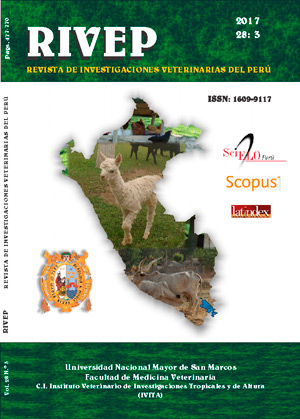Molecular identification of Salmonella Typhimurium and Enteritidis in guinea pigs at first parturition by multiplex PCR
DOI:
https://doi.org/10.15381/rivep.v28i3.13288Keywords:
guinea pigs, females at first parturition, Salmonella, multiplex PCRAbstract
The aim of the study was to identify serotypes of suspicious isolates of Salmonella spp from breeding guinea pigs in samples collected within the first week of parturition to detect animals carrying the bacteria. The guinea pigs were clinically normal and reared in a commercial farm in Pachacamac, Lima, Peru. The farm was free of Salmonella outbreaks in the last four years. A total of 272 paired samples consisting in rectal and vaginal swabs per animal were collected and analyzed using standardized microbiological protocols. The DNA was extracted from suspected isolates of Salmonella sp and then these samples were analyzed by multiplex PCR to detect the presence of invA, prot6E and fliC genes which are specific for Salmonella spp, Salmonella Enteritidis and Salmonella Typhimurium respectively. Eight animals (12 swabs) were positive to Salmonella spp. All 12 isolates amplified invA (Salmonella spp), 10 of them amplified the fliC gene (Salmonella Typhimurium) and none the prot6E gene (Salmonella Enteritidis). The results confirmed Salmonella Typhimurium as the predominant pathogen in breeding guinea pigs at first parturition in the commercial farm.Downloads
Downloads
Published
Issue
Section
License
Copyright (c) 2017 Ana Chero O., Raúl Rosadio A., Geraldine Marcelo M., Gerardo Díaz O., Ronald Jiménez A., Yenny Castro G., Lenin Maturrano H.

This work is licensed under a Creative Commons Attribution-NonCommercial-ShareAlike 4.0 International License.
AUTHORS RETAIN THEIR RIGHTS:
a. Authors retain their trade mark rights and patent, and also on any process or procedure described in the article.
b. Authors retain their right to share, copy, distribute, perform and publicly communicate their article (eg, to place their article in an institutional repository or publish it in a book), with an acknowledgment of its initial publication in the Revista de Investigaciones Veterinarias del Perú (RIVEP).
c. Authors retain theirs right to make a subsequent publication of their work, to use the article or any part thereof (eg a compilation of his papers, lecture notes, thesis, or a book), always indicating the source of publication (the originator of the work, journal, volume, number and date).










